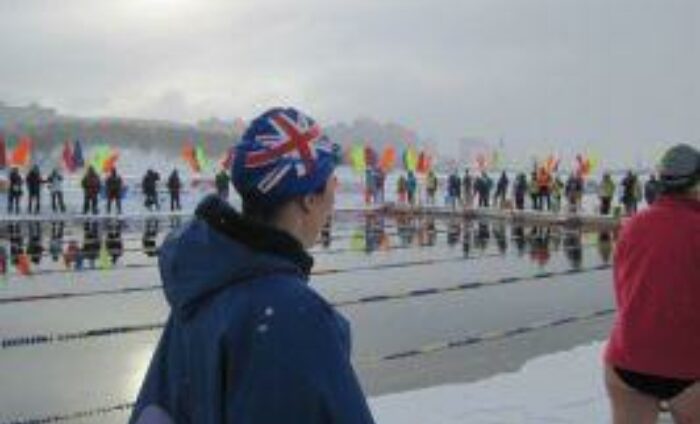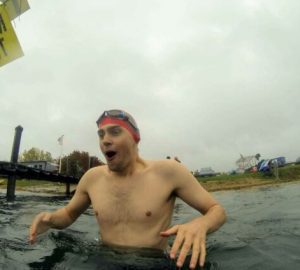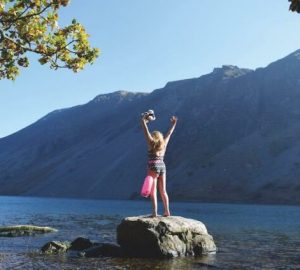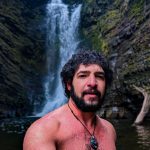
Rory Fitzgerald chills out at the first World Ice Swimming Championships
Rory Fitzgerald has just returned from Russia where, on 20 March 2015, he took part in the first World Ice Swimming Championships in Murmansk, which were organised under the rules of the International Ice Swimming Association (IISA). This is his report.
In 2014 the IISA introduced the 1km Ice Swimming event. This event allows for swimmers to compete over a distance of 1,000m in icy waters of 5 degrees Celsius or less under IISA rules (including no use of wetsuits). The IISA, which was established in 2009, aims to keep world records to support its vision to include Ice Swimming as a category in the Winter Olympic Games.
Naturally, swimming such a distance in these extreme conditions carries a certain degree of risk. The IISA exists to formalise swimming in icy water and it has put in place a well-considered set of rules to allow for maximum safety measures and to regulate swim integrity in terms of distance, time, conditions and safety.
In 2014, the IISA announced the first World Ice Swimming Championships to be hosted by the city of Murmansk, inside the Arctic Circle in the far North West of Russia. The event was timed to coincide with the 10th Russian Winter Swimming Championships, which were due to be hosted at the same venue.
Fifty one accomplished ice swimmers were invited to take part in the championship with approximately half coming from the host country, Russia, and the rest representing countries from Australia to Zimbabwe. Two swimmers – me and Kate Steels-Fryatt – would represent the UK.
My place on the team was confirmed in January and so I had just 10 weeks to prepare for this challenging event. I had earned my place through a variety of cold and open water swims, but this would be much harder than anything I had experienced before.
Cold water training involved regular swims in local rivers (the Itchen, Hamble and Avon) and the sea and I took the opportunity to visit North Wales for a week of swimming in icy lakes high in Snowdonia along with Kate, who swims for Eastleigh Swim Club. Kate even managed to procure a huge supply of ice so that we could take “ice baths” as part of our training. Our cold tolerance steadily improved.
We travelled to Murmansk on 18 March to give ourselves a day to acclimatise. Arriving at two in the morning, we were treated to a spectacular display of the Northern Lights and, along with a number of other international competitors, we were given a traditional Russian welcome of bread and salt. The following morning a group of us were taken to Semyonovskoye Lake, the venue for the competition, to test the water. It was breathtakingly cold.
On the morning of the competition all swimmers were required to undergo a full medical examination including an ECG. Everyone was allocated to a specific “heat” based on a rough estimate of anticipated speed. I was drawn in lane 4 of heat 7 along with three South African swimmers, a Czech and a Russian. The competition began with an Olympic style opening ceremony with speeches and entertainment and the competitors being led down to the ice pool behind their national flags. There was a light breeze and some cloud cover and overnight snow had left the venue sparkling and white. The pool had a covering of ice which was quickly cleared and the first heat made ready to swim.
My heat was due to start at three in the afternoon. This gave me time to watch a couple of the earlier heats and the solar eclipse (which reduced the air temperature by a few more degrees) before I submitted myself to the medical check and presented myself in the marshalling area.
I was worried that I would not be able to stay in the water long enough to complete the distance, but rationalised that at 0.8 degrees, there would be no shame in retiring early if I had to. Even if the swim itself would be OK, I knew the recovery was likely to be uncomfortable, to say the least.
Around 10 minutes before the start of my race, I, along with the others in my heat, was escorted down to the lake and a changing tent erected on the ice. Instructions were given in Russian and we all looked to the single Russian competitor in our heat for a lead as we donned hats, goggles and earplugs. My mouth was dry with fear as we were led out onto the poolside to take up position at the end of our allocated lanes. Swimmers were announced to the spectators and the starter blew a whistle to indicate that we should disrobe. A moment later we were instructed to enter the water and submerge our shoulders. There was a moment of gasping as we adjusted to the icy water and an interminable wait until the starter sounded the horn. We were off.
Ordinarily I would take a few moments before putting my head down and swimming crawl but not on this occasion. I could see the two South Africans on either side of me had gone off very fast and were several yards in front. I tried to find a good rhythm and my pace settled down, but I still had no confidence that I could complete the distance. However, after just four lengths (100m) I realised that I was gaining on one of the South Africans and I moved into second place a couple of lengths later. At 20 lengths, half way, my hands and feet had lost all feeling but I otherwise felt OK. I was perhaps 10m behind the lead swimmer and he wasn’t extending this lead. Despite my earplugs I could hear shouts of encouragement which seemed to get louder with each length. The tally boards at the end of the pool counted down steadily and with ten lengths to go I felt, for the first time, that I might finish. A finish would give me an English record for the ice kilometre, as none had yet been established.
The cheering from the poolside rose in volume and I saw that I was closing the gap on the lead swimmer. This realisation gave me a boost and I kicked harder, willing myself to go faster. With four lengths to go I was on his toes and a well-executed turn brought me up beside him. We were neck and neck going into the last 50 metres and I started to pull away as we tore down the penultimate length. All thoughts of abandoning the race were gone and replaced with the adrenaline pumping desire to win. The last length was a blur of foam and icy spray as I thrashed towards the finish. I slapped the end with numb hands, almost five seconds ahead of my rival.
People were on hand to help me from the water and rush me into an assessment tent where I was seen by a doctor who, once satisfied that I wasn’t in any imminent danger of collapse, released me to two large paramedics who half carried me off the lake to the recovery suite in the main building some 150 yards away. Once inside my hands and feet were placed in bowls of cool water whilst very hot, wet towels were wrapped around my shoulders, lower back and thighs. These were replaced every few seconds until I started to regain some feeling in my hands and feet. Recovery was rapid but very painful. I was then ushered into a blissfully hot sauna and was joined after a few moments by my fellow swimmers. The post swimming euphoria was contagious and soon everyone was laughing and recovery was complete!
My time of 14 minutes 22.92 seconds placed me fourth man overall in the competition, together with the British record and the World record for the 50+ age category. Kate’s time of 19 minutes 30.74 seconds placed her sixth lady overall and gave her the English record and the World record in the 45+ age category. 40 of the 51 contestants successfully completed the distance.
Rory also took part in the 10th Russian Winter Swimming Championships







